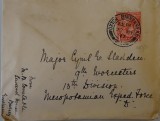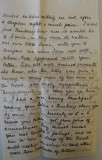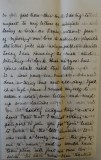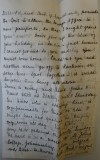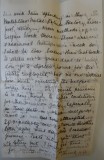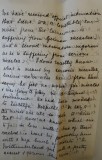at Kent House, Oxton, Cheshire
Sunday May 20th 1917
My own dear Cyril
A letter from you this morning was quite a surprise – because after receiving your pc dated March 26th, on which you say you may be away from all postal arrangements, I had tried to reconcile my mind to that fact and hardly expected a letter for 2 or 3 weeks. I love hearing from you on a Sunday - it reminds me of the first year of our engagement when you never failed to write for that day, whenever and wherever there was a Sunday delivery. It was specially welcome too because I had definitely decided to have a day in bed, after a sleepless night and much pain. I was just thinking how nice it would be if I were in my own or rather our own little home, with you to comfort me when I am not well, when Rees appeared with your letter. Like all well trained servants she knew who the letter was from, and having a young man of her own at the Front, was dually sympathetic!
“Here’s something to cheer you up, Miss”!
So I had a nice homey breakfast reading your letter and thinking about you. Of course, darling, heavenly as it is to receive your letter, yet, from force of circumstances, they cannot reveal your real thoughts and feelings, and one kiss or even a clasp of the hand would realize ourselves to each other, more than hundreds of letters.
Do you feel like this too? I do try to impart to my letters as intimate loving a tone as I can without fear of exposing our love to ridicule should the letter fall into unsympathetic hands.
Today I am running the risk and trusting to luck that no eyes but yours shall read this letter.
It is now past tea time and as I have done nothing but rest all day, I feel it is high time I roused myself to action and wrote some letters and read up some lectures.
You can hardly imagine how sick at heart I am that I cannot obtain a passport to join you for your leave to India in the late summer. It was such a lovely vision – the joy of our re-union, and it would have taken place with just our own two selves. We have never been together with no one else we knew near us. This is selfish of me, but it is a dream of rare delight, and one which I long for, because I should feel so absolutely free and natural to tell you all that is in my heart, just as you’ve so often tried to get me to do, in days gone by, when I seem to have been positively tongue tied. One realizes as one gets older how one ought to take advantage of ones opportunities, instead of pining over lost ones as I often do now.
I can see from your letters that news of the submarine warfare does not reach you in detail. It has reached tremendous proportions, and it really is tempting the Huns to travel by sea now. Even if I could obtain a passport it is a 1000 chances to 1 that I reached India safely. Still I’d risk this if I could only persuade the Government to allow the Foreign Office to issue passports, so that I might grant your wish. Don’t give up the idea of your holiday in India – just because I cannot get out to you and if you cannot come home. Couldn’t you and another man go off to Kashmir or some nice spot together – it would be jollier than being all alone.
Irene is away and Aunt Jessie and Maud still at Ilkley, until Thursday. Mr Hibbs, who is staying here, is companionable for Uncle or else I might have had qualms in keeping my room all day. Mr Hibbs is going to be ordained on Trinity Sunday. He used to be a master at St John’s College, Johannesburg, when Wilfred was there. He knows both Cecil and Wilfred. He is rejected from the Army on account of an injury to his knee. I don’t see much of him because I am out most of the day, but we hit it off quite well when we do meet. He is very interested in mankind as a study, especially young men, and apparently has a good deal of influence with them, judging from the numbers of letters he receives from them telling him their difficulties and asking his advice. He tells me about them sometimes. The more I hear of young men, the more I appreciate your dear old solid worth and realize I am a lucky girl. Don’t get conceited! But just keep up the standard of my dear funny old thing. You don’t know what joy and rest it is to me to feel I can trust you so absolutely, even though seas divide us.
This week I am spending in the Matchless Metal Polish Factory, Liverpool, studying their methods of Welfare Work there. There are 2 additional lectures this week so I shall be even busier than last week. It strikes me a great deal is being done to shorten hours for the factory employees, but no one worries how much overtime the Welfare Worker does! Still much remains to be done though to better conditions for the munition girls, especially in those factories where welfare work is not yet even attempted.
If I possibly can I’ll write another letter before mail day but I cannot promise. I hate cutting you short of letters but I barely get time for writing nowadays.
The papers tell us that there has been no serious fighting out your way for some weeks. I hope you escaped any there has been. Your job on the bend of the river sounded rather a nice one, with opportunities for reading (and perhaps writing!).
I bought you a pair of bootlaces to enclose with the socks. If the latter don’t fit give them to someone else. The next pair I make I’ll do a longer piece of ribbing at the top. They keep up better then, don’t they?
Your rank of Acting Major whilst 2nd in command of a battalion was gazetted in yesterday’s Times from Feb 10th 1917. Together with promotion for 2nd Lieutenants Bidlake and Callender, who have since been killed in action (in Times May 19th).
The account of the sinking of The Cameronia has at last been published. 140 persons missing, believed drowned.
We have received official intimation that Lieut W N B Constable, survivor from the Cameronia, is suffering from German measles – and a second intimation informs us he is suffering from serious measles. I don’t exactly know what is meant by serious measles, because we’ve also heard from him saying he felt no worse for measles and was going to play in a tennis tournament. He had been moved to Imtarfa Hospital. He says the nurses are all so nice to him that he doesn’t know which one to fall in love with! One of them reached his heart by presenting him with a large bunch of violets! “A Northumberland girl with a pretty accent and glorious blue eyes”!
When Wilfred tells you about his heart affairs you know there is nothing in it really. When there was, I mean about his engagement, he never speaks of it. He only said he would never marry – but I hope he will all the same.
With much love Sweetheart, I wish I could say that in a couple of months we might be together, but it is not to be, and we’ve still to lead separate existences, wasting much valuable time, the best part of our lives. Life is a riddle.
Ever your devoted
Mela
I’ll find out who built the Arch of Ctesiphon etc.

